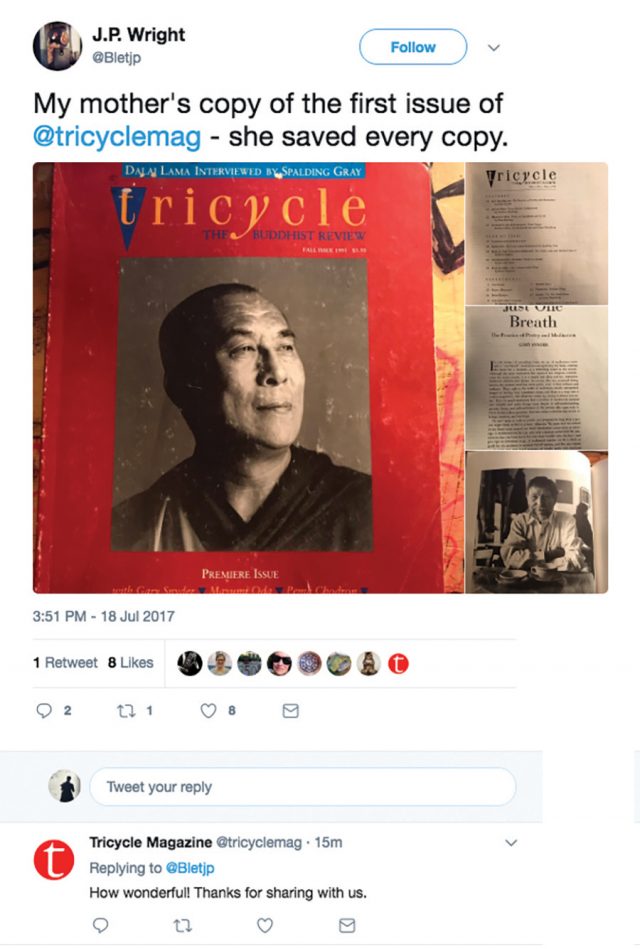
Will You Do My Makeup?
If Kodo Nishimura, from “This Buddhist Life” (Fall 2017), ever comes to the United States, he can do my makeup!
–Lita Xú Líng Kelley
Beverly, MA
The Editors: Lita, you’re in luck. Kodo is based in Japan and New York City.
The Limits of Belief
Pamela Gayle White’s “Real Belief ” (Fall 2017) generated a discussion among Tricycle readers about the role of belief. The following three letters are samples from the conversation:
I like and dislike this article at the same time. I don’t understand why people should be allowed a free pass when their irrational beliefs harm others—those who deny climate change and oppose universal health coverage, encourage wars and the proliferation of nuclear weapons. How does that possibly compare with a little old lady praying? She is doing harm to no one. When others do harm because of their beliefs, I draw a line. Yes, I would give them aid and comfort in need, but I don’t have to be thrilled about their wrong thinking.
–Mandy Barre
Oceanside, CA
[In reply to Mandy] Agreed. Compassion is one thing and is, of course, good. Permitting or even enabling evil by failing to oppose it is quite another thing and equally wrong. Confusing compassion with permissiveness is all too common an error of apologists for irrational, harmful beliefs.
–David Whiteside
Ventura, CA
I often notice that when we are trying to digest the teachings, it is the extremes we see in our world that are the bugaboo. In Q&As at dharma talks I attend, people want to apply the dharma to the most extreme situations of suffering, political disagreements, difficult relationships, and so on—but they want the problem wrapped up quick and tight.
My understanding is that the writer is reminding us of how our own internal dialogue interprets reality on a moment-to-moment basis and how we might loosen the grip on this process through self-examination. This helps us find more space and the freedom to be tolerant and respectful, even harmonious, in the face of opposing viewpoints. I certainly don’t think that the author is encouraging non-action in the face of evil or climate change deniers. We should take skillful action when we can, but getting to the “skillful” is the trick. Thanks for the encouragement, Pamela Gayle White!
–Sharon Gamsby
West Tisbury, MA

To the Mother of the Monk
Sarah, thank you for sharing your story in “When My Son Became a Monk” (Fall 2017). As a parent with children under 7 years of age, I cannot imagine how you feel. I hope that if any of my kids were to take a monastic path I would be brave and proud like you. Best wishes to you all!
–Zada Lau
Hong Kong
Like Sarah Conover’s son, Tan Po, my Thai stepson is in the monkhood. At the time when Sarah and her family were doing tudong, I was acting as a driver for one of the forest temples in northern Thailand where my stepson was spending the rains retreat season. I’m now getting my MA in Buddhist Studies, my 63-year-old’s “gap year” analogous to my stepson’s 20-something one. I like the intellectual stimulation [of school] myself; the temples are a bit too quiet sometimes. I wish you all the best.
–Hardie Karges
Songkhla, Thailand

FALL 2017 CORRECTIONS
The photograph of the gold Buddha on the first page of “Focusing” (p. 40) was taken not by Keliy Anderson-Staley but by Julian Ward.
In Joan Oliver’s “Raising Lettuce, Buddhist Style” (p. 28), Rinchen Sanpo was misidentified as Sandup Ukyab.
In “The Tree Guardians of Kyoto” (p. 66), the captions for Higashi Honganji and Honen-in were mistakenly reversed.
We apologize for the errors.